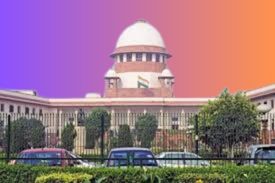Primarily contested the application on the merits of the Transfer Petition and stated that the petition was filed by accused Ketan Kantilal Seth with an ulterior motive to derail and delay the trials which are pending against him since almost 20 years in different States. He further contended that, allowing of the Transfer Petition vide order dated 09.09.2022 has led to denovo trial of R.C.C. No. 147/2002 and in fact, this Court has effectively setaside the order dated 24.06.2021 passed by Bombay High Court in Criminal Application No. 628/2021 vide which the Trial Court was directed to conclude the trial in R.C.C. No. 147/2002 within specified time, wherein hearing stood concluded, though judgment was not pronounced by Trial Court in view of the order dated 13.05.2022 of this Court. While closing the arguments, the learned senior counsel submitted that such transfer of cases by this Court has effectually led to an adverse effect on the whole efforts of all the stakeholders involved who have been in pursuit of justice since more than 20 years. (Para 6)
Mr. Tushar Mehta, learned senior counsel appearing on behalf of State of Maharashtra, contested M.A. No. 1935/2022 and sought recall/modification of the order dated 09.09.2022 predominantly on the ground that no opportunity of hearing was given to the State on the date when the matter was finally heard and same amounts to violation of principles of natural justice. It was further contended that, had there being any opportunity given to the State, all the development of the proceedings in respective Courts would have been brought to the notice of this Court. Learned senior counsel also laid emphasis on the fact that in view of the directions issued in paragraph 13(e), the trials are required to be started from the stage of framing of charge. It is said that, as per order dated 13.05.2022 of this Court, arguments were heard in R.C.C. No. 147/2002 by 155II, Additional Chief Judicial Magistrate, First Class, Nagpur and only the judgment is to be pronounced. Therefore, it was prayed that the order dated 09.09.2022 may be modified to the extent by which denovo trial of that case may be avoided. (Para 7)
After hearing learned counsels for the parties, in our view the recall of the entire order as prayed for on the instance of the intervenor is not justified, in particular looking at the detailed discussion made in order dated 09.09.2022. Simultaneously, it cannot be ignored that State of Maharashtra has filed application asking modification of the order. Therefore, in view of the aforesaid, we refrain ourselves to recall the order on insistence of the intervenor and deem it appropriate to consider the prayer of the State of Maharashtra taking note of the submissions made in this respect. (Para 15)
In view of the foregoing discussion, these applications be treated as disposedoff modifying the order dated 09.09.2022 to the extent indicated herein below – I. The order dated 09.09.2022 passed in Transfer Petition (Criminal) Nos. 333348/ 2021 is hereby modified and maintained subject to –
I. Criminal proceedings relating to Respondent/Accused Nos. 20, 23, 25, 26, 30, 31, 32 and 34 pending before transferor Court at Amravati, if already transferred to transferee Court, shall be returned to the transferor Court and continue at the transferor Court from the stage as received; IB. The review petition filed by Respondent/Accused Nos. 20, 23, 25, 26, 30, 31, 32 and 34 bearing Diary No. 36121/2022 and titled as ‘Ghanshyam Lahaunji Mudgal and others Vs. Ketan Kantilal Seth and others’ is dismissed as infructuous in view of observations made in paragraph 19 herein.
II. The transfer of R.C.C. No. 147/2002 by order dated 09.09.2022 passed in Transfer Petition (Criminal) Nos. 333348/ 2021 is restrained to the transferor Court with a clarification that the trial shall proceed from the stage of final arguments by the Presiding Officer uninfluenced by the directions in para 13(e) of order dated 09.09.2022.
III. Directions issued in para 13(e) in order dated 09.09.2022 be now read as under – “On receiving the cases as mentioned in para 13(a), the transferee Court shall proceed in those cases from the stage of the case in which it had received from the transferor Court(s). The cases in which charges have not been framed, it shall be framed within two months and the trial shall start immediately. In cases in which charges have already been framed and evidence has been started after submitting the trial program, those cases shall proceed from that stage of trial. Meaning thereby, denovo trial in such cases from stage of framing of charge is not required. The transferee Court(s) shall conclude all the trials as expeditiously as possible within a period of two years.”
IV. Lastly, we make it clear that this Court vide order dated 09.09.2022 never intended or meant to setaside the order dated 24.06.2021 passed by Bombay High Court. It is clarified that the concerned trial Court at Nagpur shall make all the endeavor to comply with the timeline as given by Bombay High Court and decide the case in accordance with law. (Para 21)
SUPREME COURT JUDGMENT
Citation: 2023 STPL(Web) 135 SC
Ketan Kantilal Seth Vs. State of Gujarat And ors.
Miscellaneous Application No. of 2023 [D.No. 33197 of 2022] In Transfer Petition (Criminal) Nos. 333348/ 2021 With M.A. No. 1935 of 2022 In T.P. (Crl.) Nos . 333348 of 2021-Decided on 4-8-2023
https://stpllaw.in/wp-content/uploads/2023/08/2023-STPLWeb-135-SC.pdf







